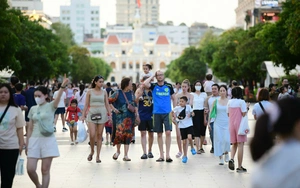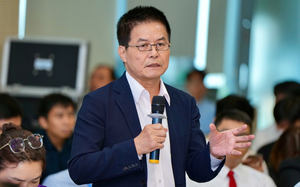
Foreign visitors take a wefie at Hoan Kiem Lake in Hanoi. Photo: Nguyen Hien / Tuoi Tre
The proposal includes a 10-year Golden Visa, a 10-year Investor Visa, and a five-year Talent Visa for foreigners who invest or possess sought-after skills, as part of Vietnam’s broader efforts to strengthen its economy and global standing.
While the initiative has been lauded by some as a move to boost economic growth, many expats feel their own contributions to Vietnam have long been overlooked, particularly in terms of permanent residency and long-term security.
Several expats took to the comment section of a Facebook post sharing the proposal to voice their concerns, emphasizing that Vietnam should focus on improving conditions for skilled professionals and long-term residents who have already contributed significantly to the country.
Commenters criticized the lack of clear pathways for permanent residency or citizenship, highlighting how they are often treated unsatisfactorily despite having lived in Vietnam for years, contributing to the economy, and fostering local development.
“The treatment of long-term expat professionals here is poor compared to other Asian countries,” remarked Jase Rz, a frequent commenter.
He pointed out that countries and territories like Singapore and Hong Kong offer permanent residency to foreigners who have lived and worked there for several years, making them more attractive to skilled workers.

Foreign tourists purchase souvenirs in Ho Chi Minh City. Photo: Quang Dinh / Tuoi Tre
In contrast, he claimed that Vietnam’s policies create an inhospitable environment for professionals, with bureaucratic hurdles and no guaranteed long-term security for foreigners who have integrated into Vietnamese society.
Others echoed similar sentiments, underscoring that the country’s visa and residency rules often leave foreigners in a state of uncertainty, with frequent changes in regulations and no clear path to permanence.
“I’ve lived here for over 30 years and still feel like a third-class citizen,” said Edouard George, a long-term resident.
He suggested that Vietnam should learn from countries that allow foreign residents to stay permanently after years of contribution, rather than continuing with restrictive policies that discourage professional expatriates.
At the same time, some foreigners expressed frustration with the country’s reliance on low-skilled labor, particularly in the education sector.
Marykate O’Shaughnessy, a teacher, lamented the emphasis on cheap, inexperienced teachers over qualified professionals, arguing that this mentality undermines the quality of education in Vietnam.
“The quality of teaching has never been stellar, but the emphasis on cutting costs has only worsened since COVID-19,” she said, adding that many experienced teachers have already left the country due to these trends.

Foreign tourists spontaneously perform a dance after completing a double-decker water bus tour in Ho Chi Minh City. Photo: Duyen Phan / Tuoi Tre
On the other hand, some commenters voiced skepticism about the government’s latest proposal to attract investors and skilled workers, with one individual pointing out that the plan is likely to benefit only the wealthy and large businesses, rather than everyday expats.
“This is for big dollar businesses, not for regular foreigners living and working here,” remarked Nicholas Goss, suggesting that the proposed visa would do little to address the needs of ordinary expats.
Some suggested that Vietnam should focus on retaining skilled professionals by providing more stable visa and residency options.
“Attracting talent is one thing, but keeping them is another,” said Jean-Philippe Eglinger, highlighting the importance of offering long-term security and recognizing the contributions of foreigners who have already established themselves in Vietnam.
Despite the frustrations, many expats remain hopeful that Vietnam will eventually revise its immigration policies to better reflect the contributions made by foreign residents.
“We don’t want to take over—we just want to make a contribution,” said Adrian Prior, who expressed support for the idea of a more inclusive approach to foreign workers in the Southeast Asian country.
As Vietnam continues to develop its immigration framework, it is clear that many foreigners hope to see policies that balance attracting investment with recognizing the long-standing contributions of those already calling the country home.
The challenge will be to craft an approach that benefits both the local economy and the foreign workforce that plays a vital role in its growth.




Max: 1500 characters
There are no comments yet. Be the first to comment.